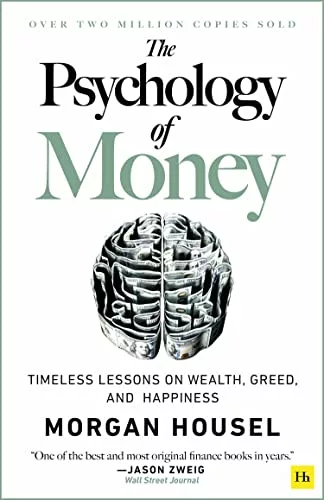The Psychology of Money
The Psychology of Money: Timeless Lessons on Wealth, Greed, and Happiness by Morgan Housel.

Timeless Lessons on Wealth, Greed, and Happiness
The first eBook on the Wagepay Reading List is “The Psychology of Money: Timeless Lessons on Wealth, Greed, and Happiness” by Morgan Housel. The writer’s wealth of experience and expertise in the finance industry provides valuable insight into how to approach money and wealth. This book was our first pick because of how its theme of rethinking money is so related to our mission of helping people revolutionise the way they access their pay early, summed up perfectly by the following quote:
“doing something you love on a schedule you can’t control can feel the same as doing something you hate.”
How you think is what matters
One of the key themes of the book is that how we think about money is more important than the mechanics of money. Housel argues that money is not just about numbers and calculations, but also about the emotions, behaviours, and decisions that surround it. He provides plenty of examples that demonstrate how our emotions can lead us to make poor financial decisions, and how understanding these psychological factors can help us make better choices.
A strength of the book is that Housel acknowledges that there is no one-size-fits-all solution when it comes to money, and that what works for one person may not work for another. Instead, he encourages readers to think critically about their own values, goals, and priorities, and to use this self-awareness to make informed financial decisions.
Real World Applications
The book is divided into 19 short stories, each of which covers a different aspect of the psychology of money. The chapters are organised in a logical and easy-to-follow manner, and the writing style is clear and engaging. Housel uses simple language and avoids jargon, making the book ideal for readers with different levels of financial knowledge.
Another strength of the book is that it is grounded in real-world examples and research. Housel draws on a wide range of sources, from academic studies to personal anecdotes, to illustrate his points. He also provides historical context, showing how the psychology of money has evolved and how it it is closely related to time in our modern lives.
“Money’s greatest intrinsic value—and this can’t be overstated—is its ability to give you control over your time.”
Wealth is What You Don’t See
One of the most thought-provoking chapters in the book is “Wealth is What You Don’t See.” Housel argues that we tend to focus on the visible signs of wealth, such as expensive cars and houses, rather than the invisible factors that contribute to financial success, such as frugality, patience, and perseverance. He suggests that we need to shift our focus from the outward manifestations of wealth to the inner qualities that enable it. So, while having access to the money you need is important, it’s just as important to only spend money on what you really need to achieve your personal goals.
The Psychology of Money is a valuable and insightful book that offers practical advice on how to approach money and wealth. It is well-written, well-researched, and accessible to readers with different levels of financial knowledge. The book is not a how-to guide or a get-rich-quick scheme, but rather a thoughtful and nuanced exploration of the psychological factors that shape our relationship with money. Whether you are a seasoned investor or just starting to think about your financial future, this book is well worth reading.

